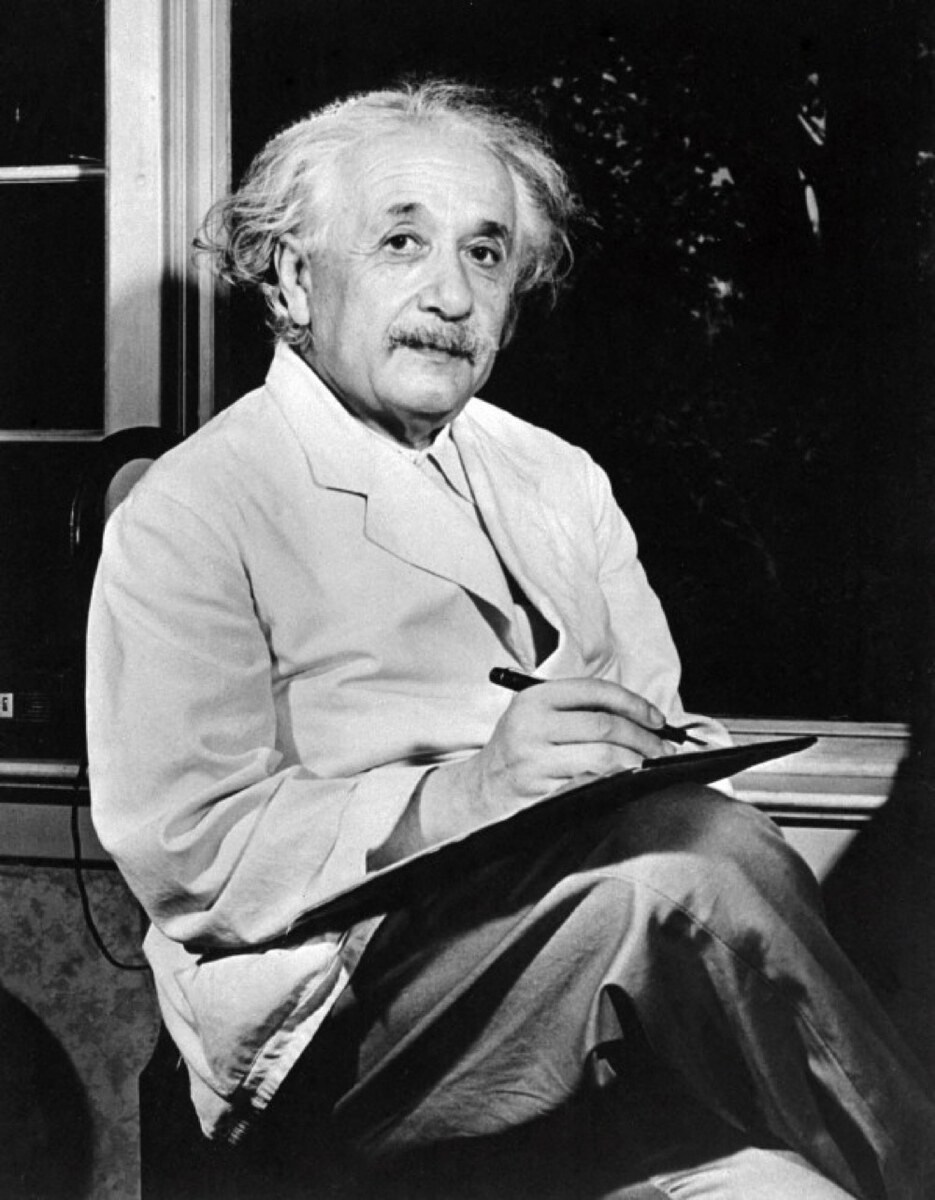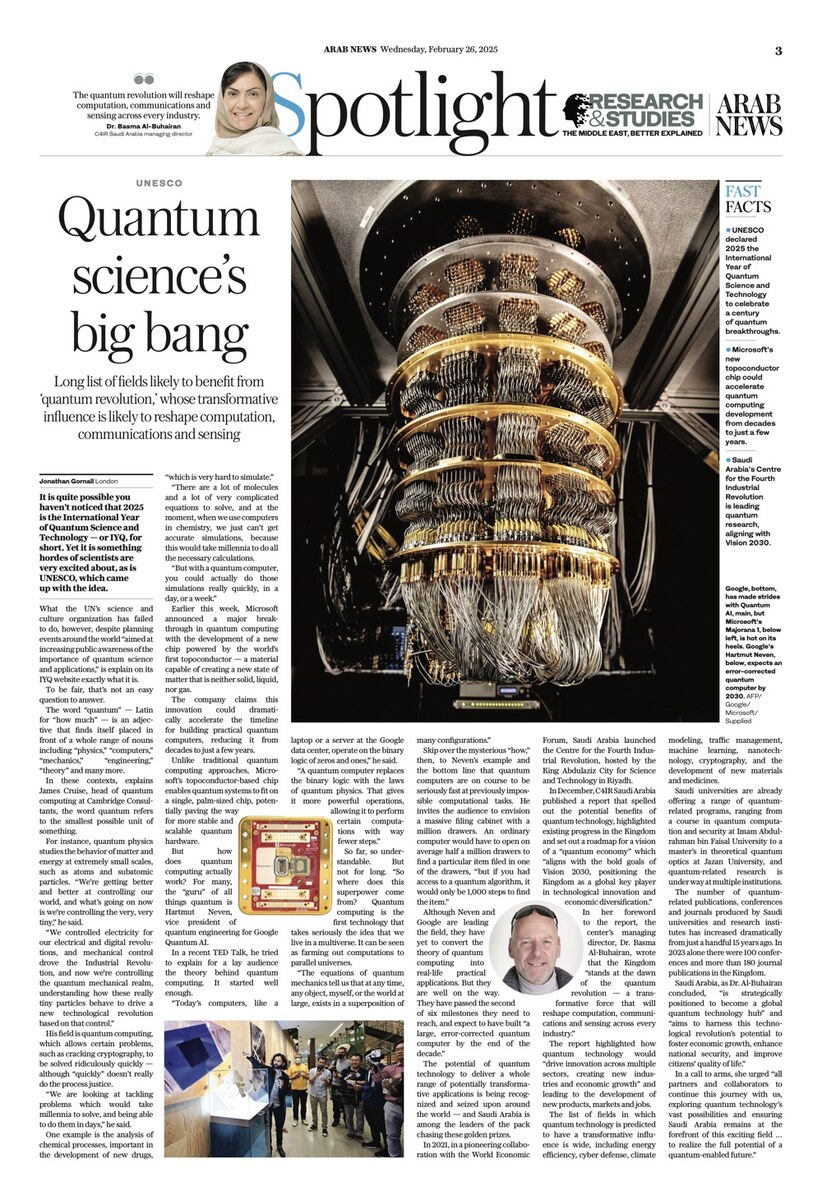LONDON: It is quite possible you haven’t noticed that 2025 is the International Year of Quantum Science and Technology — or IYQ, for short. Yet it is something hordes of scientists are very excited about, as is UNESCO, which came up with the idea.
What the UN’s science and culture organization has failed to do, however, despite planning events around the world “aimed at increasing public awareness of the importance of quantum science and applications,” is explain on its dedicated IYQ website exactly what it is.
To be fair, that’s not an easy question to answer.
The word “quantum” — Latin for “how much” — is an adjective that finds itself placed in front of a whole range of nouns including “physics,” “computers,” “mechanics,” “engineering,” “theory” and many more.
In these contexts, explains James Cruise, head of quantum computing at Cambridge Consultants, the word quantum refers to the smallest possible unit of something.
For instance, quantum physics studies the behavior of matter and energy at extremely small scales, such as atoms and subatomic particles.
“We’re getting better and better at controlling our world, and what’s going on now is we’re controlling the very, very tiny,” he said.
“We controlled electricity for our electrical and digital revolutions, and mechanical control drove the Industrial Revolution, and now we’re controlling the quantum mechanical realm, understanding how these really tiny particles behave to drive a new technological revolution based on that control.”
His field is quantum computing, which allows certain problems, such as cracking cryptography, to be solved ridiculously quickly — although “quickly” doesn’t really do the process justice.
“We are looking at tackling problems which would take millennia to solve, and being able to do them in days,” he said.
One example is the analysis of chemical processes, important in the development of new drugs, “which is very hard to simulate.”
“There are a lot of molecules and a lot of very complicated equations to solve, and at the moment, when we use computers in chemistry, we just can’t get accurate simulations, because this would take millennia to do all the necessary calculations.

“But with a quantum computer, you could actually do those simulations really quickly, in a day, or a week.”
Earlier this week, Microsoft announced a major breakthrough in quantum computing with the development of a new chip powered by the world’s first topoconductor — a material capable of creating a new state of matter that is neither solid, liquid, nor gas.
The company claims this innovation could dramatically accelerate the timeline for building practical quantum computers, reducing it from decades to just a few years.
Unlike traditional quantum computing approaches, Microsoft’s topoconductor-based chip enables quantum systems to fit on a single, palm-sized chip, potentially paving the way for more stable and scalable quantum hardware.
But how does quantum computing actually work? For many, the “guru” of all things quantum is Hartmut Neven, vice president of quantum engineering for Google Quantum AI.
In a recent TED Talk, he tried to explain for a lay audience the theory behind quantum computing. It started well enough.
“Today’s computers, like a laptop or a server at the Google data center, operate on the binary logic of zeros and ones,” he said.
“A quantum computer replaces the binary logic with the laws of quantum physics. That gives it more powerful operations, allowing it to perform certain computations with way fewer steps.”
So far, so understandable. But not for long.
“So where does this superpower come from? Quantum computing is the first technology that takes seriously the idea that we live in a multiverse. It can be seen as farming out computations to parallel universes.
“The equations of quantum mechanics tell us that at any time, any object, myself, or the world at large, exists in a superposition of many configurations.”

Skip over the mysterious “how,” then, to Neven’s example and the bottom line that quantum computers are on course to be seriously fast at previously impossible computational tasks.
He invites the audience to envision a massive filing cabinet with a million drawers. An ordinary computer would have to open on average half a million drawers to find a particular item filed in one of the drawers, “but if you had access to a quantum algorithm, it would only be 1,000 steps to find the item.”
Although Neven and Google are leading the field, they have yet to convert the theory of quantum computing into real-life practical applications. But they are well on the way. They have passed the second of six milestones they need to reach, and expect to have built “a large, error-corrected quantum computer by the end of the decade.”
Neven predicts that such computers will unlock a host of breakthroughs in multiple fields, such as designing more effective, more targeted medicines or lighter, faster-charging batteries for electric cars or aircraft, or even finally making reality the long-pursued dream of producing energy from nuclear fusion reactors.
FASTFACTS
• UNESCO declared 2025 the International Year of Quantum Science and Technology to celebrate a century of quantum breakthroughs.
• Microsoft’s new topoconductor chip could accelerate quantum computing development from decades to just a few years.
• Saudi Arabia’s Centre for the Fourth Industrial Revolution is leading quantum research, aligning with Vision 2030.
Thanks to quantum science, your smartphone or watch, he predicts, may one day be able to warn you of the presence of dangerous viruses in the air or detect “free radicals,” the unstable atoms linked to cell death and illness, in your body.
“In conclusion,” said Neven, wrapping up his TED Talk, “we are making steady progress towards building the world’s first useful quantum computer and applying its enormous power to important challenges.
“A quantum computer will be a gift to future generations, giving them a new tool to solve problems that today are unsolvable.”
So if quantum technology is still at the “dream big” stage of development, why is UNESCO celebrating it this year in particular?
“The reason we’re celebrating this year is because the theory of quantum mechanics has been around for a century,” said Cruise.

“We are also at the point where the theory is now coming to fruition and actually seeing uses, and we’re building real-use cases and technology based upon this.”
Nominating 2025 as the centenary of the discovery of quantum science and technology is not without controversy. It was, after all, in 1922 that Danish physicist Niels Bohr was awarded the Nobel Prize in Physics for his work — a decade earlier — on the structure of atoms, “based on quantum theory,” the study of how everything operates at an atomic level.
Bohr is regarded as one of the fathers of quantum theory — a parenthood he shares with Max Planck and Albert Einstein, both of whom also received Nobel Prizes for their work on quanta.
Planck received his Nobel in 1918, “in recognition of the services he rendered to the advancement of physics by his discovery of energy quanta.” Einstein was awarded the prize in 1921 “for his services to theoretical physics, and especially for his discovery (in 1905) of the law of the photoelectric effect.”
Today, whether a century or more on from those pioneering discoveries, the potential of quantum technology to deliver a whole range of potentially transformative applications is being recognized and seized upon around the world — and Saudi Arabia is among the leaders of the pack chasing these golden prizes.
In 2021, in a pioneering collaboration with the World Economic Forum, Saudi Arabia launched the Centre for the Fourth Industrial Revolution, hosted by the King Abdulaziz City for Science and Technology in Riyadh.
In December, C4IR Saudi Arabia published a report that spelled out the potential benefits of quantum technology, highlighted existing progress in the Kingdom and set out a roadmap for a vision of a “quantum economy” which “aligns with the bold goals of Vision 2030, positioning the Kingdom as a global key player in technological innovation and economic diversification.”
In her foreword to the report, the center’s managing director, Dr. Basma Al-Buhairan, wrote that the Kingdom “stands at the dawn of the quantum revolution — a transformative force that will reshape computation, communications and sensing across every industry.”
The report highlighted how quantum technology would “drive innovation across multiple sectors, creating new industries and economic growth” and leading to the development of new products, markets and jobs.

The list of fields in which quantum technology is predicted to have a transformative influence is wide, including energy efficiency, cyber defense, climate modelling, traffic management, machine learning, nanotechnology, cryptography, and the development of new materials and medicines.
Saudi universities are already offering a range of quantum-related programs, ranging from a course in quantum computation and security at Imam Abdulrahman bin Faisal University to a master’s in theoretical quantum optics at Jazan University, and quantum-related research is under way at multiple institutions.
The number of quantum-related publications, conferences and journals produced by Saudi universities and research institutes has increased dramatically from just a handful 15 years ago. In 2023 alone there were 100 conferences and more than 180 journal publications in the Kingdom.
Saudi Arabia, as Dr. Al-Buhairan concluded, “is strategically positioned to become a global quantum technology hub” and “aims to harness this technological revolution’s potential to foster economic growth, enhance national security, and improve citizens’ quality of life.”
In a call to arms, she urged “all partners and collaborators to continue this journey with us, exploring quantum technology’s vast possibilities and ensuring Saudi Arabia remains at the forefront of this exciting field … to realize the full potential of a quantum-enabled future.”























